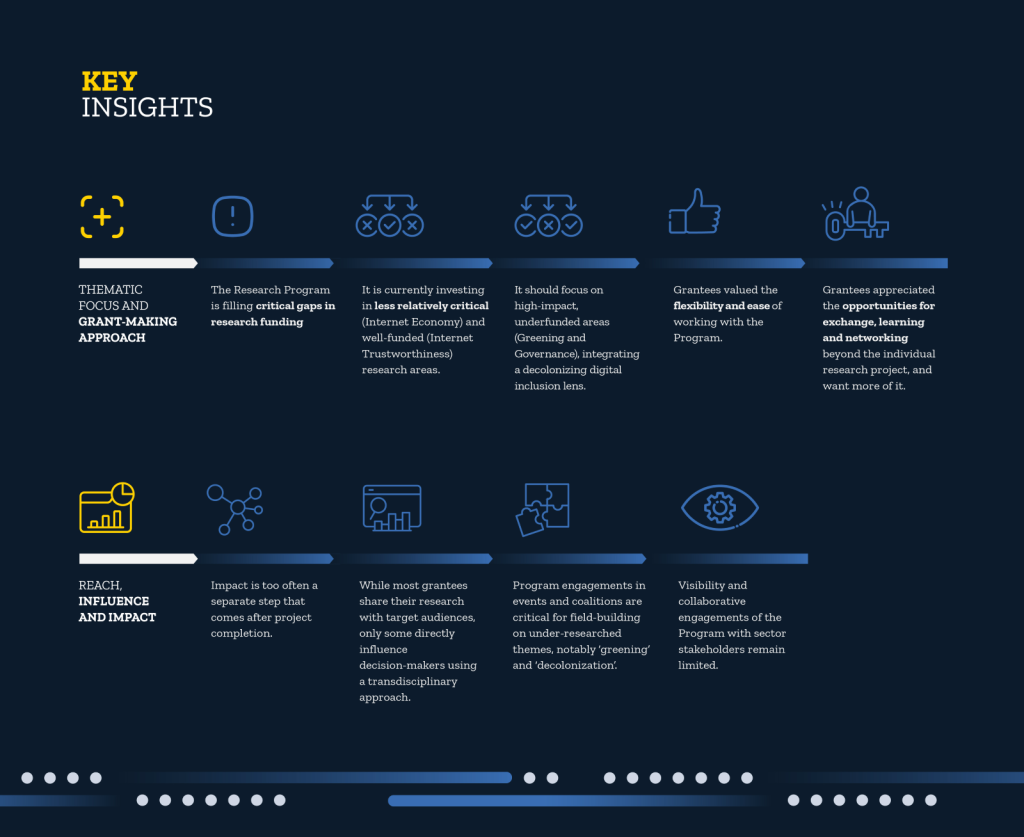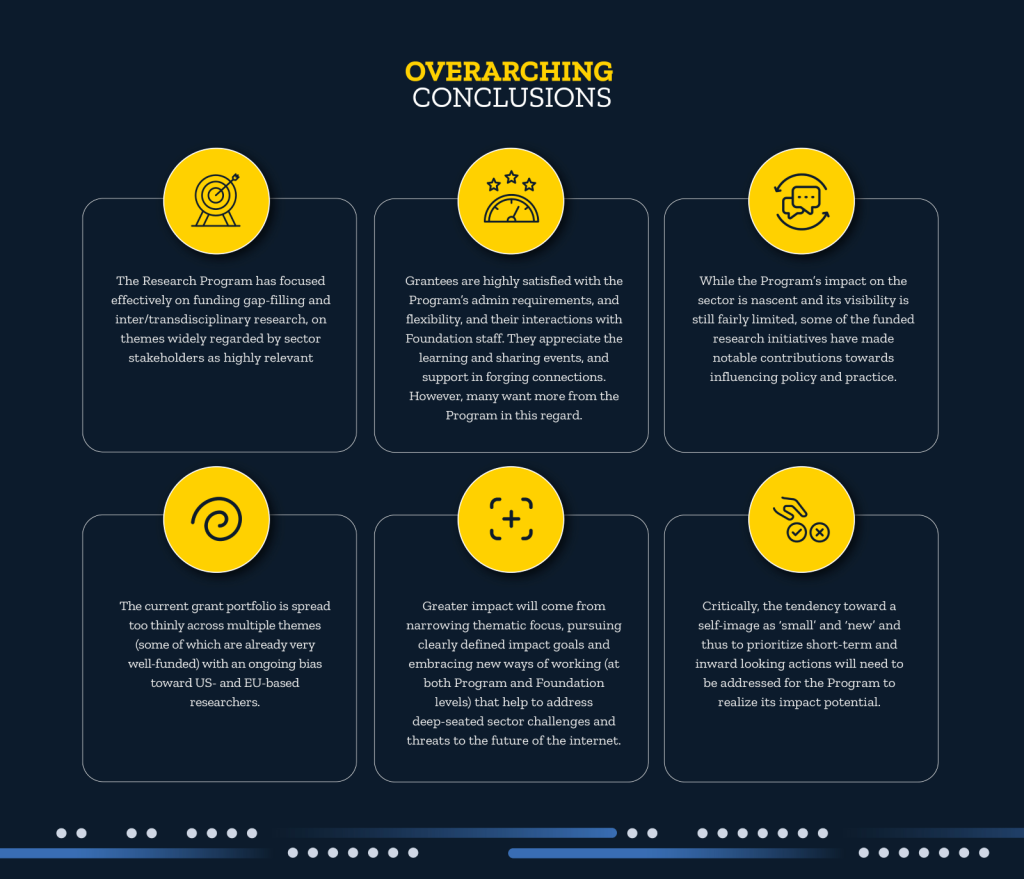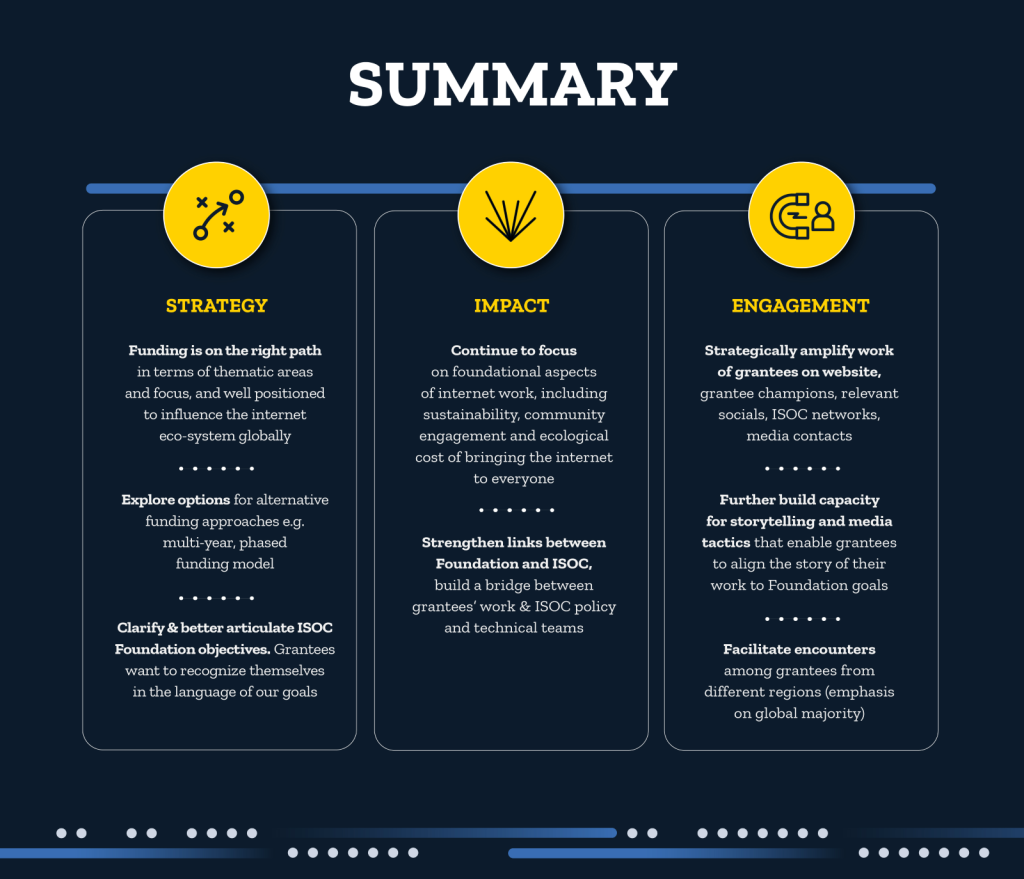By Sophie Rodriguez, MEL Specialist
At the Internet Society Foundation, our Research Program has been fostering meaningful engagement with grantees from around the world through Learning Sessions. Launched in 2022, these sessions are guided by the core principles of social accountability, trust-building, and reflective learning practice. Our goal is to create an open, collaborative space where grantees not only build connections, share, and expand on the progress of their work among colleagues but also have the space to hold us accountable as we support their work.

From July 9-11, 2024, the Internet Society Foundation hosted a Learning Session in Berkeley, California, bringing together over 18 U.S.-based researchers and grantees from leading tech-for-social-impact organizations and research centers in the country. Over the course of two days, we dived into a sense-making process to discuss the findings from the research program evaluation that was conducted between December 2023 and May 2024 by Collaborative Impact, alongside the communities that shaped the findings. We held a similar virtual session on October 3rd with grantees who could not join us in person. Together, we worked to reflect on and validate the findings and discuss the implications of the evaluation findings for the future of the Internet Society Foundation’s Research Program. This inclusive approach allowed to integrate more nuanced discussions into this sense-making process, ensuring that our conclusions are not only well-grounded but also informed by diverse perspectives from across the grantee community.

Program Evaluation key findings
In this blog, we share some of the highlights that emerged from these Learning Sessions which are valuable in their own right, keep us accountable to our grantee community and will play a critical role in shaping our vision for the future of the Research program. By reflecting on these findings, we can continue to adapt our approach and deepen our impact.

Conclusions from the program evaluation
Niche funding is part of the Research program’s strength
In the evaluation, a central question we focused on was whether the Research program was doing the ‘right thing’ by channeling funding through a thematic approach. Funding themes include Greening the Internet, Decolonizing the Internet, Trustworthy Internet, and Internet Economy. The grantees in the session responded to this question with a key consideration in mind: the Internet Society Foundation’s unique position and trajectory within the sector, as well as its relationship with the Internet Society. As one of the few funders in the philanthropic space that fund research on the Internet, the Research program’s support has been crucial in advancing grantees’ research on foundational aspects of the Internet, such as infrastructure, online safety protocols, the ecological cost of the Internet, and community engagement.
This shift in perspective reminded us to remain wary of the ‘shiny object syndrome’— the tendency to chase the latest funding trends in the sector, which are often already well-funded—while potentially overlooking the complex, unresolved questions of the development and evolution of the Internet. As one grantee insightfully noted, “The things that transform the Internet have always been there; they will always be important and need funding.” These reflections compel us to consider how the program can build on its strengths while exploring alternative funding models, including longer grant cycles, flexible funding schemes, and enhanced networking opportunities.
Grantee Engagement is Strong, But There’s More to Do
While we’ve seen significant progress in building strong relationships within and across grantee cohorts, we recognize that our work is far from complete. Grantee engagement has been robust, with collaborative sessions and open feedback channels yielding valuable insights. However, there is still room for more strategic support. Among the gaps grantees have shared via the reflections on findings, was the need to facilitate thematic in-person engagements, with a mix of ‘new’ and more seasoned researchers/organizations, including grantees beyond the Research program.
A potential and well-tested avenue for increasing grantee engagement is establishing a Community of Practice (CoP). In both online and in-person discussions, grantees have expressed a shared sense of interconnections in their work, though the reach and impact of their efforts can sometimes feel dispersed. A CoP could offer a structured way for grantees to share knowledge and resources, and collaborate more effectively. In addition, we see opportunities to further support grantees’ participation at key events and gatherings, such as the UN Internet Governance Forum (IGF), ICANN meetings, RIR meetings, IETF, and academic conferences like the International Studies Association, AoIR, ICA, and the Stanford Trust and Safety Research Conference. These spaces offer valuable platforms for grantees to network, showcase their work, and engage with global research communities.
As we continue to evolve and refine our engagement approach, we are committed to expanding opportunities for co-creation and amplifying grantee voices. The Internet Society Foundation’s goal is to ensure that our processes remain responsive, inclusive, and attuned to the needs of our grantee community. We encourage critical feedback and dialogue among grantees and with the program team, as well as documenting and sharing these in more accessible and effective ways. Whether it’s adapting materials to other languages or creating content optimized for social media, we aim to ensure that work is easily shared and useful for grantees.
Storytelling tactics are critical for grantee’s success
Researchers shared that they often face the challenge of outreach and dissemination of their work. Communication and storytelling are usually unfunded aspects of research grants, especially if researchers are not part of a larger research institute or university. Since the learning session in July, the Communications and Programs teams have put in place processes to support this feedback by:
- Providing details of where and who the Research program is funding on the website and highlighting grantee work more regularly through our social media channels.
- Continuing to use the Internet Society Foundation mailing list as a space to share grantee work, encourage feedback, lite peer reviews and encourage the community to make asks of each other.
- The Foundation is working to provide clear processes for communicating and outreach with grantees, including guidelines on how and when to contact the Communications team for support.
- Supporting the development of briefing sheets and talking points on the funding themes and areas that we can share with grantees so that their internal messaging is aligned with Foundation goals and objectives.

Feedback on findings from learning sessions
As the Internet Society Foundation’s MEL team, we were incredibly proud to create a space where grantees could hear the results of our most popular grant program and engage with us in responses to the findings. We will continue to work with our Program team colleagues to refine the Research program approach in line with the Internet Society 2030 strategy and in support of our goal to protect the Internet’s reach and long-term well-being.
